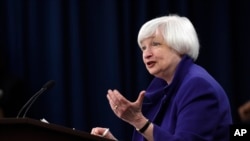A series of back-to-back speeches by members of the U.S. Federal Reserve is raising the possibility that central bank policymakers may be signaling a rate increase soon.
This week, Dallas Federal Reserve President Robert Kaplan said he expected at least two rate hikes in 2016. On Thursday, Fed Governor Jerome Powell said that despite global risks and steady but unremarkable growth in the U.S., the improving employment picture and rising inflation suggested “another rate increase may be appropriate."
Federal Reserve Chair Janet Yellen is likely to weigh in Friday when she attends an award ceremony at Harvard University.
The central bank’s benchmark rate — the rate it charges banks on short-term loans — has remained near record lows since the end of the financial crisis to stimulate the economy and boost hiring. The Fed last raised interest rates in December 2015. Since then, slowing growth around the world and increased financial volatility have delayed moves to “tighten” or “normalize” U.S. monetary policy.
Asked by a VOA reporter whether his remarks Thursday at the Peterson Institute for International Economics were part of a coordinated effort by the Fed to signal a rate hike next month, Powell said the back-to-back speeches likely were “coincidental.” He said that he would support a rate hike when the bank’s policymakers meet next month, but that his vote would depend on incoming data.
“The great thing is I don’t have to decide until June 15, and I really think you discard the opportunity to evaluate incoming information when you decide too early,” he said.
No harm in waiting
At the same time, Powell said, there is little risk to the economy if the Federal Open Market Committee waited a bit longer to normalize rates.
“This doesn't feel like an economy that’s bubbling over or threatening to break into high inflation," he said. "I think the right plan, as I said, is a gradual set of rate increases over time.”
Economists fear that a prolonged period of low interest rates could fuel high inflation, which could ultimately stall the economy. Although prices for consumer goods have been rising, inflation remains below the Fed’s target rate of 2 percent. Given the Fed’s dual mandate of steady employment and stable prices, Powell said, it faces a delicate balancing act.
“You don't want to wait too long, but neither do you want to be in a hurry,” he said.
A growing number of economists who have spoken to VOA believe the odds of a rate hike in June or July have risen dramatically since the start of 2016. The 17 members of the policymaking arm of the central bank meet June 14-15.




